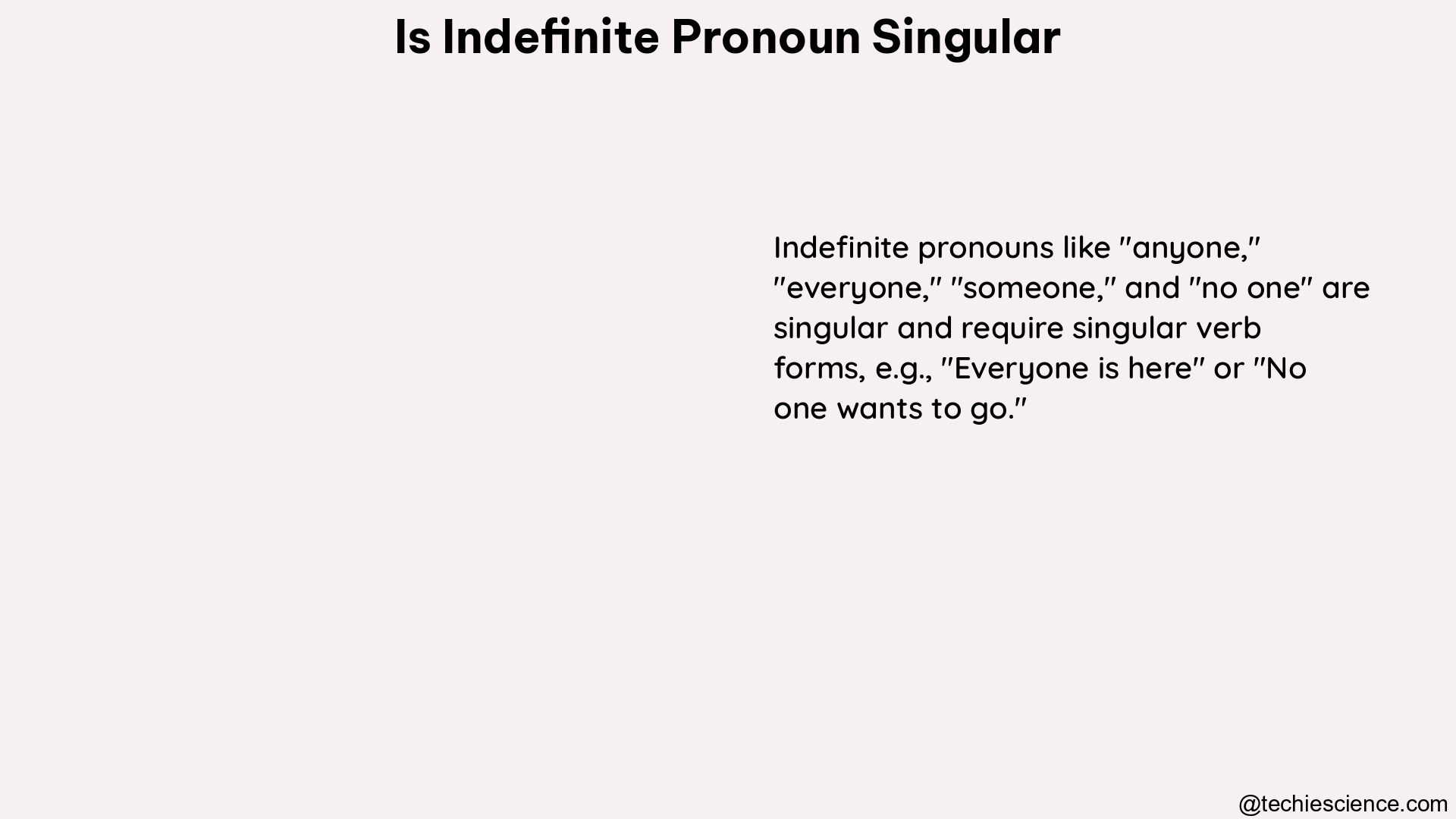Indefinite pronouns are a crucial part of the English language, but their singular or plural nature can be a source of confusion for many learners. This comprehensive guide will delve into the intricacies of indefinite pronouns, providing a detailed exploration of their singular, plural, and context-dependent forms, along with a wealth of examples and rules to help you master this essential grammatical concept.
Singular Indefinite Pronouns
Singular indefinite pronouns are used as singular nouns in a sentence and are paired with a singular verb. These pronouns refer to a single person or thing, even if they may seem to imply a larger group. Examples of singular indefinite pronouns include:
- another
- anybody
- anyone
- each
- either
- everybody
- everything
- less
- little
- much
- nobody
- other
- somebody
- something
Here are some examples of singular indefinite pronouns in use:
- “Everyone is going to the party.” (singular verb “is”)
- “Each decides their own path.” (singular verb “decides”)
- “Somebody has left their wallet on the table.” (singular verb “has”)
Plural Indefinite Pronouns

Plural indefinite pronouns are used as plural nouns in a sentence and are paired with a plural verb. These pronouns refer to multiple people or things. Examples of plural indefinite pronouns include:
- both
- few
- many
- others
- several
Here are some examples of plural indefinite pronouns in use:
- “Both are available; which one would you like?” (plural verb “are”)
- “Few realize the implications of such a perspective, and fewer still are seriously addressing them.” (plural verb “are”)
- “Many will need their tablets.” (plural verb “will need”)
Indefinite Pronouns that Can Be Singular or Plural
Some indefinite pronouns can be either singular or plural, depending on the context and how they are used in the sentence. These include:
- all
- any
- more
- most
- none
- some
- such
To determine whether these pronouns are singular or plural, you need to look at the rest of the sentence and how the pronoun is being used. If the indefinite pronoun is referring to a single object or person, it is likely a singular indefinite pronoun. If it references more than one object or person, it is a plural indefinite pronoun.
Examples:
- “All of this is mine!” (singular verb “is”)
- “All are in attendance.” (plural verb “are”)
- “Some of the cake is missing its frosting.” (singular verb “is”)
- “Some of the cake slices are missing their frosting.” (plural verb “are”)
Additional Examples and Rules
Here are some more examples and rules to help you understand the use of singular and plural indefinite pronouns:
Singular Indefinite Pronouns
- “Each of the students is missing his or her homework.” (singular verb “is”)
- “Everybody needs his or her pencil.” (singular verb “needs”)
Plural Indefinite Pronouns
- “Many will need their tablets.” (plural verb “will need”)
- “Several are missing their notebooks.” (plural verb “are”)
Indefinite Pronouns that Can Be Singular or Plural
- “All of the cake is missing its frosting.” (singular verb “is”)
- “All of the cake slices are missing their frosting.” (plural verb “are”)
Conclusion
In summary, understanding the singular, plural, and context-dependent nature of indefinite pronouns is crucial for ensuring proper subject-verb agreement and clear communication in both written and spoken English. By mastering the rules and examples provided in this comprehensive guide, you can confidently navigate the complexities of indefinite pronouns and elevate your language skills to new heights.
References
- English Grammar 101. (n.d.). Indefinite Pronoun Agreement. Retrieved from https://www.englishgrammar101.com/module-2/pronouns/lesson-11/indefinite-pronoun-agreement
- Termium Plus. (n.d.). Indefinite Pronouns. Retrieved from https://www.btb.termiumplus.gc.ca/tpv2guides/guides/wrtps/index-eng.html?lang=eng&lettr=indx_catlog_i&page=9A7V3j-fLVyE.html
- Termium Plus. (n.d.). Verb Agreement with Indefinite Pronouns. Retrieved from https://www.btb.termiumplus.gc.ca/tpv2guides/guides/wrtps/index-eng.html?lang=eng&lettr=indx_catlog_v&page=9KXNxZKIGPOU.html
- Scribbr. (2023). Indefinite Pronouns | Definition, Examples & List. Retrieved from https://www.scribbr.com/nouns-and-pronouns/indefinite-pronouns/
- Study.com. (n.d.). Plural & Singular Indefinite Pronouns | Overview & Verb Agreement. Retrieved from https://study.com/academy/lesson/identifying-errors-with-indefinite-pronoun-verb-agreement.html
Hey! I am Arpita Bose Roy. My qualifications are M.A. in English with B. Ed. in both general education and special education. I have 2 years of experience as a “language analyst” at IIT Kharagpur and 4 years of experience as an “Academic Content Developer” at IIT Kharagpur. Currently, I am working as an academic writer at Lambdageeks.